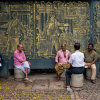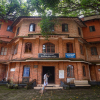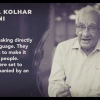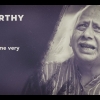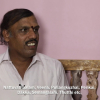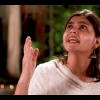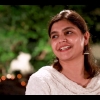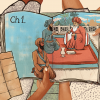Ki. Rajanarayanan, or Ki. Ra. as he is popularly known, is an author and folklorist from Tamil Nadu. His unique style and usage of language marked a milestone in Tamil literature and played a big role in its growth.
Ki. Ra. was born in the village of Idaicheval Chathiraptti near Kovilpatti in 1922. His full name was Rayangala Shri Krishna Raja Narayana Perumal Ramanujam Naicker, which he shortened to Ki. Rajanarayanan. He was born in a traditional agricultural family and attended local school till class 7, after which he discontinued his education. Throughout his early youth, he had a long fight with tuberculosis which, at the time, was considered a terminal disease. He himself calls his recovery ‘a miracle’. Despite his health complication, he was an active member of the Communist Party of India, and was imprisoned twice for his participation and support of the Peasant Rebellions of 1947-51.
Ki. Ra. took to writing post 30, and his first short story Mayamaan was published in 1958. It loudly announced the arrival of a new voice in Tamil literature, and received much critical acclaim. Mayamaan was soon followed by many other short stories, novels, essays and other writings. Two of his novels, Gopalla Gramam and its sequel Gopallapurthu Makkal, were huge successes. The sequel which narrated the story of Telugu migrants in Tamil Nadu won the Sahitya Akademi Award in 1991. His novella Kidai was made into a film and was screened at the International Film festival of India in 2003.
Ki. Ra.’s stories are based in his land, Kovilpatti, and its surrounding areas. This region in southern Tamil Nadu is hot and dry, and is populated by simple village folk, subsisting on farming and cottage industries, whose lives are pepped up with music, festivals and stories, as if to offset the austerity of nature around them. Through his stories, Ki. Ra. depicts the ordinary life in this kaarisal kadai, the drought-stricken land, as he calls it, the tales of its people, their struggles, tears and dreams. His characters speak in spoken Tamil. His use of spoken Tamil, often crude, sometimes bordering on obscene, which is often the case with hard-working people in the countryside, was a landmark deviation from the use of literary Tamil that was employed by the writers till then. Ki. Ra. faced fierce opposition and criticism from the literary purists of the time, but he was not ready to change track. He believed that spoken language is the right form of language, and prose need not be restricted by the rules of grammar. Following his lead, writers from other regions and communities were soon proudly writing in their own dialects. Ki. Ra. is immensely popular among common masses who related to his language and identified with his characters.
Another major contribution by Ki. Ra. is in the field of folklore. He spent decades travelling around the rural areas, collecting and recording folktales. Again, without bothering about public criticism, he published erotic folktales too. Annam, a publishing house based in Thanjavur, brought out a collection of these folktales titled Nattuppura Kadhai Kalanjiyam (Collection of Country Tales) in 2007. Pritham K. Chakravarthy translated a selection from this anthology, and published Where Are You Going, You Monkeys? Folktales from Tamil Nadu in 2009.
Despite the lack of formal school education, Ki.Ra. served as a professor of folklore of the Tamil Department of Puducherry University, and later, held the title of Director of Folktales in the university's Documentation and Survey Centre. It was during his tenure at the university that he was able to research and compile about 200 folktales of Puducherry.
A powerful storyteller, fearless and candid, Ki. Ra. believed in his own land and people, and incorporated its simplicity in his life and ways. Since 1989, he has made Puducherry his home, where, having lived a long and productive life, the 98-year old has now retired.
Following is an edited transcript of the video interview with Ki. Rajanarayanan conducted by M.D. Muthukumaraswamy in August 2019.
M.D. Muthukumarasway (MDM): Let me begin by asking about your childhood days.
Ki. Rajanarayanan (KiRa): There was nothing special about my childhood. I was diagnosed with tuberculosis when I was very young. In those days there was no cure for TB. I knew there was no cure. By the time I was told about my illness, it had already gone worse. Actually, the doctors did not reveal it to me for a long time.
MDM: In which year did it happen?
KiRa: It must be in 1943 or '44. It was definitely before 1950. There is a reason I remember the year so well. I am from Madanapalli, in Chittoor District, near the Dharmavaram railway line. That railway line itself was amazing. What we have now is a broad gauge line. At that time there were only meter gauges. But this particular line at Dhramavaram was even smaller than the meter gauge. This sort of line was not there anywhere else. From Pakkala Junction the line ran through Dharmavaram and went on to Tirupathi. I remember it very well. I joined duty on 09.09.50. But before that, I suffered a lot because of my illness. I came to know about it very late. But, of course, I did not die. It was a miracle.
I decided to learn music. I thought I would learn vocal first.
MDM: Who did you learn the music from?
KiRa: Kurumalai Ponnusamy Pillai.
MDM: Did you wish to become a singer?
KiRa: No. I wanted to learn to appreciate music. I couldn’t sing for a long time because of my weak lungs, so, I thought of learning to play an instrument. My music teacher was a nadaswaram player. But as I was not able to play the instrument with the necessary force, I couldn't learn it too. Then I thought I would learn violin. I went with my teacher to Madurai and bought a violin. Thus I started to learn violin. But whatever I wanted to do, my disease posed a big hindrance. When it was too much to bear, I went to Putheri, near Nagarcoil, to the Salvation Army Hospital run by Christian missionaries. A doctor from America, called Noble, was in charge of the hospital. One surprising thing about him was that, though he was a foreigner, like us he did not wear sandals. And he wore a dhoti, just like us. And like us, he wore a collar-less shirt—a half-sleeve shirt. But it was not white in colour, it was always in some other colour—like blue, green, etc. He spoke to me in Tamil. He had learned the language to be able to communicate with his patients.
You asked me about my early days, didn't you? I was confined to bed for about eight months. Though the doctor asked me to get admitted in the hospital right away, I didn't do so. I had no money. I went back home. I told my family: OK, if no one is coming with me, I’ll go and get admitted in the general ward. I was ready to leave, and then my mother decided to come with me. She packed essential things and we left for the hospital.
MDM: The freedom struggle was at its peak then, wasn't it?
KiRa: Yes, it was. The struggle was at its peak in 1945–46. Especially in 1946, when a huge uproar broke out. I could hear the pandemonium from my bed. For eight months I hardly had any sleep, you know.
MDM: Your first story appeared in 1954, right?
KiRa: Yes.
MDM: In which magazine did it appear?
KiRa: No, the story came out not in 54, but in 59. It was published in the magazine Saraswati. Then the Tamarai magazine wanted me to write a story for them. Jeeva was the editor. My story Kathavu was published. They sent me a money order of ten rupees. Thinking that if I kept it, I would squander it, I bought some useful things. It was the time when stainless steel was introduced for the first time.
MDM: This was 1959?
KiRa: Yes.
MDM: What were the utensils made of earlier?
KiRa: They were [made] of brass, copper, etc.
MDM: You have written on such issues, right? Like how eating rice came late to this part of the country.
KiRa: Paddy was grown here alright. But after a long drought, rice was imported from Rangoon.
MDM: When was this?
KiRa: I don't remember.
MDM: In many of your stories, eating rice was written about as being a big deal.
KiRa: Yes, rice had arrived in Tirunelvelli. But rice was imported from Burma after the drought. It was said that about two lakh people died in Bengal because of the famine. If I start talking about how rice was imported, it will take a long time. How paddy was harvested in Burma, how they cut down teakwood and brought it here…there are so many things to tell. I have written about some such things.
MDM: You didn't use colloquial Tamil in your earlier stories, did you?
KiRa: No, I didn't. They would not allow me. They vehemently opposed. But I didn't care.
MDM: You started using colloquial Tamil first in your story in Karisal Kaattu Kadudasi.
KiRa: Yes, it started from that story. Jayakanthan started writing in Ananda Vikatan. You will be surprised to know that he too wrote like me in the beginning. We were thrilled to read his stories. The stories of Jayakanthan were coming in Saraswati magazine then. After a while, I came to know that Vikatan was trying to get stories from Jayakanthan. When Jayakanthan went out, Balan (of Ananta Vikatan) would offer him a lift. Jayakanthan would refuse. Anyway, Balan charmed him somehow, and then asked him for a story. Jayakanthan said no. Balan promised to publish the story without any changes. Jayakanthan gave him a story about a strike in a printing press. If you ask me when I told Jayakanthan that I knew all this, it was when I was hospitilised in Chennai for a treatment. But Jayakanthan himself came to see me. It was a great surprise! We went up and I saw a car. It was a foreign car, a second-hand one. Oh, did you buy a car? I asked. Yes, come with me, he said. He took me to his house and we chatted for a long time. It was then that I came to know that he was very interested in Western music. ‘Paul Robeson, the international singer—Have you listened to him?’ he asked. I said no. He put on the record. It was a new experience for me. His voice! After that Jayakanthan asked me if I had heard the music of this German composer.
MDM: Mozart.
KiRa: Yes. The orchestra. He played it to me.
MDM: So, you were listening to Western music for the first time then?
KiRa: Yes. The pitch was so perfect. We always say the pitch should be perfect. No one can sing like that. It was very enjoyable. Jayakanthan enjoyed it very much. It helped him very much to write about Western music in his novel Parisukku Po.
MDM: Tell us about the musicians of your period. You mentioned Vilathikulam Samikal earlier. Tell us more about him.
KiRa: I can talk more about nadaswaram artistes. One reason is because Karaikurichi Arunachalam's wife was from my hometown. So, Rajarathnam Pillai used to visit him there. During temple festivals, nadaswaram musicians from all over would camp in the villages of Kadambur, Kazhugumalai, Kovilpatti, Sankarankovil, etc., and perform for two to three days. I learned to appreciate the music after listening to these performances. We had a gramophone at home. We had records only of Carnatic music. We had records of nadaswaram music, songs of K.B. Sundarambal, S.G. Kitappa, etc. I used to listen to them again and again.
MDM: Who do you like the most?
KiRa: I like all Carnatic musicians. They say Rajarathnam was the best among nadaswaram performers. Then there were the Thiruveezhimizhalai brothers. The elder one served as a village panchayat president once. To find a nadaswaram performer as a panchayat president is rare!
MDM: Were all writers interested in music then?
KiRa: Yes, especially the writers from Tanjavur. Music was in their lives constantly by virtue of the place.
MDM: So, from the parched land of Tirunelveli, only you and Alagiri (Ku. Alagirisami) were interested?
KiRa: Other writers, too, were interested as the nadaswaram was played in the streets constantly.
MDM: Tell us about Vilathikulam Samikal.
KiRa: He didn't learn his music from anyone. He could interpret ragas in various ways. Other singers, for example G.N.B. (G N Balasubramaniam), he would sing Kalyani in the same way no matter where he sang. But Vilathikulam Samikal was not like that. Vilathikulam could take a raga and expand it for hours or even days. He was capable of that. No one else could do that.
MDM: You are saying Vilathikulam Samikal could sing a raga in various ways.
When Rajarathnam Pillai released his gramophone recording of Todi on nadaswaram, it created a huge stir and amazement.
KiRa: Not amazement, they were scared. Other performers were scared. They would not be able to perform like him. If this man has sung the Todi like this, how are we going to sing it differently? If they sing it in the same old way again, people would be bored and would demand a new version.
MDM: So, you are saying GNB and all sang in the same way again and again.
KiRa: Yes. They never thought of singing in a different way. Even the listeners did not seem to want a change. They did not think of asking: Why are you singing in the same way over and over again? But one person asked—Subbudu (dance and music critic P.V. Subramaniam, popularly known as Subbudu). He said that you singers learn roughly 25 songs and sing them in the same way for the rest of your lives and earn money on that. Yes, he had the guts to say that.
MDM: This was because of the impact created by Vilathigulam Samigal?
KiRa: Yes, but they (the Brahmins) will not agree, you know. They are smart in the way that if there is something they are not able to do, they will just ignore or reject it. They have always been like that. Suppose a new raga or style has been created, either the creator must be a Brahmin or his teacher must be a Brahmin.
MDM: You used spoken Tamil first in your novel Karisal Kaattu Kadudasi. Could you talk about the criticism that you faced then?
KiRa: Those who met me in person expressed their displeasure directly to me. Maybe people cursed me or badmouthed me behind my back. My close friends— Ku. Alagirisami and Chidambara Raghunathan (Tho Mo Ci)—they opposed it vehemently. They said, when you are writing fiction, you should employ only literary language. You should not use spoken language. I asked them: Is there a law preventing me from doing that? Then they said: There is something called language discipline. Earlier, the fictional characters used pure Tamil. Later, they switched to informal language. How did that happen? So changes do happen. So I asked: Can't you take this, too, as a change like that? No, they replied. See, I am a storyteller. A teller means you have to tell. You have to narrate. That is the right thing to do. I decided I would use only colloquial Tamil in my stories. Later, the responses I got were overwhelming. Unbelievable! People accepted my stories. We write only for them, right? It was a big surprise when the educated Dalits began to write in their dialect, following my style. To talk about printing, if you take cinema notice or theatre ads, you find that the style is uniform. Once Aadimoolam did a drawing for my works. His drawing was asymmetrical. People appreciated it very much. If you look at cinema notices now, you can see that the writing is asymmetrical.
So it is all about how beauty is perceived. Also, there is exaggeration even in beauty. That is not natural. For example, take a statue of Rathi (Goddess of love). In ancient days women did not wear blouse. They sometimes just wore a cloth covering their breast or not. So, if you enter a temple, you can see statutes of females with massive breasts. That is not normal. That is an exaggeration, isn’t it?
MDM: Yes.
KiRa: So, man has a tendency to exaggerate or cross natural limits. You know, what I am saying. A farmer sends his son to learn Tamil. Let my son go and learn Tamil, he thought. When the son came back, he spoke in classical Tamil asking his parents to go to the kitchen and bring him some food. They couldn’t make any sense of his words. The father got very scared. His mother too was frightened. Some ghost must have possessed their son. He only went to learn Tamil! They locked him up and asked him to keep quiet. Apparently ghosts are scared of tamarind stick. The son saw his father coming back with a stick. He understood the matter and said in everyday Tamil: I am hungry, please give me some kanji. The father dropped the stick. Oh, my son is all right now. The terms of address like Annai, thaadai—Does anyone write like that now? No one does, let alone address one’s parents like that.
MDM: So, following this, you started collecting folk tales, published sexual stories, prepared a dictionary of spoken words, etc. You did a lot of work on spoken language.
KiRa: Yes. My novella Kidai—before talking about it, I have to tell you something else. After I finished writing my novel Gopalla Gramam, I kept the draft with me for seven years. My friends would read it and say it was fantastic, and I should get it published. I had used the word 'motherfucker' in it. Chitti (of Readers Circle Book Venture) read the novel and berated me for using the word. What will women say when they read it? I said: If you decide to remove the word, give the novel back to me, don't publish it. He was taken aback, and right away took it to Mrs Lakshmi Krishnamoorthy. She was the daughter of Satyamoorthi. A Brahmin girl from a very religious family. He gave her the book to read. She read it and laughed. Are you saying this is a big issue? she asked. My father used to say this all the time. This word should remain in the novel. Only then can it be called colloquial. Why I am saying all this is that we refuse to come out of our orthodox shell and hence lose out on many other perspectives.
So, I started consolidating folk tales. Stories that we tell each other. There are many kinds of folk tales. The kind that are told by children. The kind of tales that adults tell children. The kind of tales that adults tell each other. The kind that the children tell each other. The stories that are told in private, in the bedroom. And there are morality tales told by people like Kripananda Variyar. So many varieties! All these are folk tales. There were those choultries in villages, right? Men stayed there, men went there to spend the night, they lazed around, they played cards, also men went there as they didn't have anywhere else to go. So, the choultry served as a meeting place of many such people. When it was dark, they would tell stories. I started by compiling those interesting stories.
Slowly, I started looking at other kinds of stories. Then, I slowly went to the sexual stories.
MDM: How were these stories received? Were they welcomed or criticised?
KiRa: They were received well. See, the disapproval had no valid base. The disapproving people feared that the vulgarity they perceived in my stories would undermine society. They were worried about what would happen if things came out of the closet. Wild animals should remain in the forest. What will happen if the tiger or the elephant comes out of the forest? They will kill everyone. The wolf will eat up the children. Just pure fear.
MDM: Tell us about your experiences of teaching at the university.
KiRa: I have written a lot about my university experiences. At first, I was invited by Ka Na Su (Ka. Na. Subramaniam) to the place where he was a guest lecturer. I was a bit scared at first. Because I had never attended school. How would I teach the university students? He told me that this place was not like a regular college, where the kids might act like ruffians. There are only research students in the university. He told me one more thing. Those students were not familiar with the realities of life. Their lives had always revolved around their studies. When a writer, especially from a rural background, talks to them about life, it would be the best kind of education they would get. You have to talk to them about life. My friends thought I would find it difficult. But one of my relatives said: Why are you thinking so much? Just keep a resignation letter in your pocket. If you don't like it, just resign and come back. So, I went, and what happened was not as I had feared. They treated me well, gave me a chair, its back draped in a towel and a table with pen stand and all. Before this, I was scared of teachers. Now they were scared of me. They were thinking, now what was this fellow going to do here and why did their VC (vice chancellor) respect him so much.
MDM: Of all your stories which is your favourite?
KiRa: This has always been an uncomfortable question for me. After all, I write only what I like. But you are never satisfied with it. As I said, I worked on Gopalla Gramam for seven years. I revised it constantly. I couldn't do much fine-tuning in Gopallapurathu Makkal, so it is not so great. One may say that the incidents in Gopalla Gramam appear to be episodic. But if you read carefully, you will find that the story flows well and reads beautifully. I wrote to the editor of the Kumudam magazine about the novel I had written, and asked him if it could be serialised in the magazine. He asked me to send him only the first chapter. The first chapter sets the backdrop. The story really starts from the second. So I sent both the chapters together. There was no reply at all. The reason they do this is because they are so regressive in their outlook. That novel was celebrated ten or twenty years later. That only means they were regressive earlier. We are slow to appreciate good literature.
MDM: Who is your favourite Tamil writer?
KiRa: I like different writers for different reasons. For example, Puthumaipithan. He wrote about a variety of things. I have read his works again and again. Then, among the Tanjavur writers, Thi. Janakiraman. I really like his style. Then, there is Ku. Pa. Ra. You have to read everything, right? Each writer writes on particular things. Like that, others may say I too have some favourite topics. We writers always feel that there are many more things to write about. Otherwise, we would have stopped writing. Sundara Ramaswamy did not write for nine years. Jayakanthan stopped writing. He wrote about Shankaracharya and the magazines decided never to ask him to write for them. And it was his habit to write only if he was asked—commissioned. For instance, even I feel compelled to write when I get a request. Though sometimes it is hard to fulfil these requests.
MDM: In your long journey in life, what do you think are the major changes you have seen in literature, social life, etc.?
KiRa: I can only talk about the changes that happened in my own life. I was born in an agricultural family. But I didn't pursue farming. Then, the sickness I was afflicted with. Then my wife, my family, my writing, my interest in music—when I turn back and look at my life, I feel as if it has all been an illusion. I didn't plan anything. I have never lived life according to a plan. Somehow it all happened. Sometimes, when I think of it, I myself am surprised. For example, this interview. You have come all the way to interview me. I never thought this would happen. Neither did you.
MDM: No, I have been planning this for a long time.
KiRa: Maybe you have been thinking about this—I wasn't. Nowadays so many things don't matter to me. All these awards and trophies on my shelves… it all seem worthless now. Nothing matters now.



